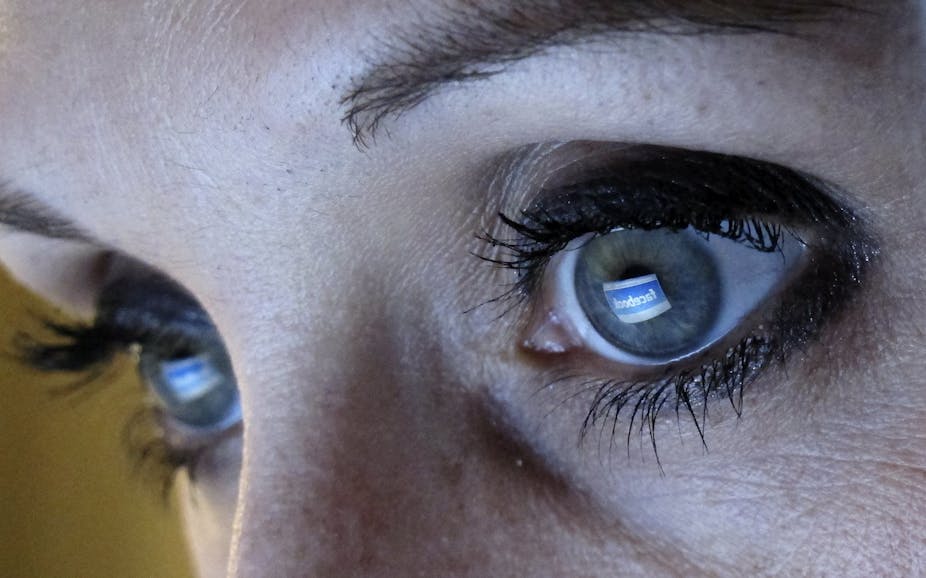It’s been shown that the use of social media comes with pros and cons: increased social connection and enhanced commitment in relationships, but also increased depression and decline in well-being.
One common situation that can lead to negative feelings is the problem of coping with the end of a relationship in the age of Facebook – when the ex’s profile is there to be seen and pored over, potentially causing untold psychological anguish. Even Facebook has recognised we can’t help ourselves, and introduced a tool that will prevent a user coming across any mention of the ex-partner.
My research has found that a third of people involved in a relationship admitted that they “very often” looked at their current partner’s Facebook page, and about the same number admitted they Facebook-stalked an ex-partner through Facebook at least once a week.
Facebook surveillance is often perceived as a typical, harmless response to a breakup, but I’ve found that such Facebook stalking may obstruct the natural process of getting over an ex. More specifically, I found that this sort of surveillance was associated with greater distress over the breakup, protracted longing for an ex-partner, more negative feelings towards and sexual desire for the ex, and lower personal growth.
This has been supported by other studies, which found that those who Facebook stalk their exes are six times more likely to pursue unwanted intimacy with the ex-partner, such as by following or approaching them, sending letters or leaving gifts. This can be perceived as moderately threatening by former partners, who may experience anxiety and depression as a result.
So are some individuals more vulnerable to “unhealthy” or problematic uses of social networking sites such as Facebook? Can excessive use create problems where previously none existed?
Facebook’s window to other people’s lives
Problematic Facebook use (“Facebook addiction”) is characterised by a preoccupation with Facebook that leads to excessive use, feelings of withdrawal when away from it, and even some degree of vocational and/or social impairment such as neglect of academic studies or close relationships. A recent study found that people who are socially anxious but crave companionship were particularly susceptible to problematic Facebook use.
These people may prefer to socially interact online rather than face-to-face because it satisfies their need to belong without the stress of meeting in person. And of course, with only an online profile they have far greater control over how they present themselves to others. But if this preference for socialising online rather than face-to-face becomes excessive it can interfere with close relationships, or performance at school or work.
However, because this study collected only correlational data at one point in time, it cannot establish whether Facebook addiction is a symptom of social anxiety, or whether it’s a unique disorder in its own right. Perhaps a longitudinal research approach, examining psychological phenomena over long periods of time, can shed further light on the roots of Facebook addiction and its consequences.
For example, another study found that social anxiety, loneliness and depression were associated with more problematic internet use a few months later. This problematic internet use was in turn associated with social and work impairment a few months later still. But the study found little support for the reverse, that impairment led to problematic internet use and, in turn, social anxiety, loneliness, and depression. This suggests that Facebook addiction and problematic internet is something unique, something extra that contributes to social and work problems over and above the more understood effects of social anxiety, loneliness and depression.
Facebook stalking
So is it that too much Facebook turns otherwise emotionally stable adults into jealous cyberstalkers? Or is it just that some are more disposed towards more obsessive behaviour than others?
I’ve found that people with an anxious attachment style – that is, those with low self-esteem, a fear of rejection, and greater jealousy in relationships – are more likely to Facebook stalk current and ex-partners. They may monitor their Facebook profiles to feel close to them, and to identify or ward off any threats from real or imagined romantic rivals.
It’s not inevitable that anyone who uses Facebook will become a problematic user, but this sort of social media surveillance uniquely contributes to negative feelings after a breakup – more so than just what those with attachment anxiety might feel without using Facebook. Again, this suggests that Facebook surveillance isn’t just a symptom of anxious attachment, but something extra.
So the studies all point to the idea that problematic Facebook use, whether of the “Facebook addict” or “Facebook stalker” varieties, does bring its own problems that can be detected above and beyond the negative effects of conditions such as anxiety, depression and post-breakup distress that it’s associated with. However we still can’t say for sure whether social media or Facebook is the root of these problems, rather than pre-existing psychological tendencies. For now, the jury’s still out.

